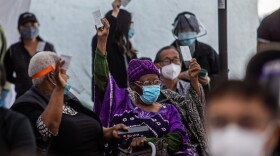
Yuki Noguchi
Yuki Noguchi is a correspondent on the Science Desk based out of NPR's headquarters in Washington, D.C. She started covering consumer health in the midst of the pandemic, reporting on everything from vaccination and racial inequities in access to health, to cancer care, obesity and mental health.
Since joining NPR in 2008, Noguchi has also covered a range of business and economic news, with a special focus on the workplace — anything that affects how and why we work. In recent years, she has covered the rise of the contract workforce, the #MeToo movement, the Great Recession and the subprime housing crisis. In 2011, she covered the earthquake and tsunami in her parents' native Japan. Her coverage of the impact of opioids on workers and their families won a 2019 Gracie Award and received First Place and Best In Show in the radio category from the National Headliner Awards. She also loves featuring offbeat topics, and has eaten insects in service of journalism.
Noguchi started her career as a reporter, then an editor, for The Washington Post.
Noguchi grew up in St. Louis, inflicts her cooking on her two boys and has a degree in history from Yale.
-
NewsA decade ago, Army recruiters started coaching individuals to help them lose weight so they could enlist. It's not an official Army program, but it has become necessary to recruitment, many say.
-
The Centers for Disease Control and Prevention released preliminary data on Wednesday showing the number of births in the U.S. has dropped to the lowest level since 1979.
-
NewsAs the number of people seeking therapy soars during the pandemic, CVS has begun testing a model to offer counseling services in its stores. It hopes to reduce costs for both patients and itself.
-
Drug store chain CVS is piloting a program to bring mental health counseling into 12 retail stores. The goal is to improve access to care, and reduce medical costs associated with poor mental health.
-
NewsOne smart way of getting the vaccine to communities at high risk of COVID-19: Take it to places many patients already visit three times a week.
-
About half of dialysis patients nationally are Black or Latino and vulnerable to severe Covid-19 or death. Many get dialysis three times a week, so vaccinating at those centers would be efficient.
-
Misinformation about COVID-19 vaccines began circulating the Black community when chat groups were infiltrated to sow doubt. There are now tactics to spread more accurate information about vaccines.
-
Some doctors are seeing a disturbing spike in lethal alcoholic liver disease, especially among young women. The recent trend has been supercharged, they say, by the pandemic's isolation and pressures.
-
NewsThe 85-year-old Tibetan spiritual leader scrapped plans to receive the injection at home, opting instead to travel to a clinic. "More people should have courage to take this injection," he said.
-
The Biden team wants to swiftly vaccinate people of color and others most vulnerable to COVID-19. But health centers are learning that speed and achieving racial equity don't always go hand in hand.





